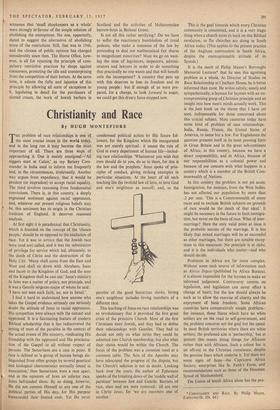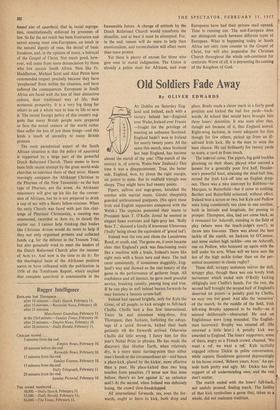Christianity and Race
By HUGH MONTEFIORE THE problem of race relationships is one of the most crucial issues in the world today, and in the long run it may become the most important of all. There are three ways of approaching it. One is merely emotional—'All niggers start at Calais,' as my Battery Com- mander in India used to inform me frequently and, in the circumstances, irrelevantly. Another way argues from expediency, that it would be prudent (or imprudent) to accept racial equality. The third involves reasoning from fundamental convictions. There is, in this country, a deeply engrained sentiment against racial oppression, and, whatever our present religious beliefs may be, this sentiment has its origin in the Christian tradition of England. It deserves reasoned analysis.
At first sight it is paradoxical that Christianity, which is founded on the concept of the 'chosen people,' should be so opposed to the exaltation of race. Yet it was to service that the Jewish race were (and are) called, and it was the substitution of privilege for service which led, ultimately, to the death of Christ and the destruction of the Holy City. `Many shall come from the East and West and shall sit down with Abraham, Isaac and Jacob in the Kingdom of God, and the sons of the Kingdom shall be cast out.' Jesus's ministry to Jews was a matter of policy, not principle, and it was a Gentile sergeant-major of whom he said : 'I have not seen such faith, no, not in Israel.'
I find it hard to understand how anyone who takes the Gospel evidence seriously can seriously doubt the attitude of Jesus to racial oppression. His sympathies were always with the outcast and oppressed. It is a fascinating feature of modern Biblical scholarship that it has rediscovered the setting of most of the parables in the context of the actual events of His ministry, vindicating His friendship with the oppressed and His proclama- , tion of the Gospel to all without respect of Persons. The Samaritans are a case in point. If race is defined as `a group of human beings dis- tinguished from other groups by several genetical and biological characteristics normally found in association,' then Samaritans were a race apart, and in the opinions of Jews an inferior race. Jesus befriended them. By so doing, however, He did not commit Himself to any one of the political parties of His day, for His purpose transcended their limited ends. Yet He never condemned political action by His future fol- lowers, for the Kingdom which He inaugurated was not merely spiritual: it meant the rule of God in every department of human life—includ- ing race relationships. 'Whatsoever you wish that men should do to you, do so to them, for this is the law and the prophets.' Jesus spoke of prin- ciples of conduct, giving striking examples in particular situations. At the heart of all such teaching lies the twofold law of love, to love God and one's neighbour as oneself; and, as the parable of the good Samaritan shoWs, loving one's neighbour includes loving members of a different race.
This teaching of Jesus on race relationships was so revolutionary that it provoked the first great crisis of the primitive Church. Most of the first Christians were Jewish, and they had to define their relationships with Gentiles. They had to decide not only on what terms they could be admitted into Church membership, but also what their status would be within the Church. The focus of the problem was a common meal at a common table. The Acts of the Apostles may have telescoped the progress of the dispute, but the Church's solution is not in doubt. Looking back over the years, the author of Ephesians speaks of the breaking down of the 'middle wall of partition' between Jew and Gentile. Barriers of race, class and sex were removed : 'all are one in Christ Jesus, for 'we are members one of another.' This is the goal towards which every Christian community is committed, and it is a very tragic thing when a church turns its back on this Biblical revelation, as the churches are doing in South Africa today. (This applies to the present practice of the Anglican communion in South Africa, despite the unexceptionable attitude of its Synods.) It is the merit of Philip Mason's Burroughs Memorial Lectures* that he sees this agonising problem as a whole. As Director of Studies on Race Relationship at Chatham House, he is better informed than most. He writes calmly, sanely and sympathetically, a layman for laymen with an un- compromising grasp of Christian principle and an insight into how men's minds actually work. This is the ,best book on the theme that I have yet seen, indispensable for those concerned about this crucial subject. Most countries today have some kind of problem of race relationships : India, Russia, France, the United States of America, to name but a few. For Englishmen the question presents itself in its most pressing form in Great Britain and in the great sub-continent of Africa; in this country, because we have a direct responsibility, and in Africa, because of our responsibilities as a colonial power and because of our concern with what happens in a country which is a member of the British Com- monwealth of Nations.
In this country the problem is not yet acute. Immigration, for instance, from the West Indies, has not affected our population by more than .2 per cent. `This is a Commonwealth of many races and to exclude British subjects on grounds of race would be the death of that ideal.' It might be necessary in the future to limit immigra- tion, but never on the basis of race. What of inter- marriage? Here the only valid point at issue is the probable success of the marriage. It is less likely that mixed marriages will be as successful as other marriages, but there are notable excep- tions to this statement. No principle is at stake, and it is the individuals who matter—and who should decide.
Problems in Africa are far more complex. Without some such source of information such as Africa Digest qpublished by Africa Bureau), it is almost impossible for the layman to make an informed judgement. Controversy centres on legislation, and legislation can never effect a change of heart; but the law should always be such as to allow the exercise of charity and the enjoyment of basic freedom. Some African countries have comparatively simple problems: for instance, those States which have no white settlers are on the road to self-government, and the problem concerns not the goal but the speed. In most British territories where there are white settlers, the professed aim is 'partnership,' but at present this means doing things for Africans rather than with Africans. Such a colour bar is an affront to the Christian conscience, despite the genuine fears which underlie it. Yet there are some signs of hope—the Capricorn Africa Society, enterprises like St. Faith's Farm, and recommendations such as those of the Diocesan Synod of Mashonaland.
The Union of South Africa alone has the pro- * CHRISTIANITY AND RACE. By Philip Mason. (Lutterworth, 10s. 6d.) fessed aim of apartheid, that is, racial segrega- tion, constitutionally enforced by processes of law. So far the net result has been frustration and unrest among most non-Europeans, an insult to the natural dignity of man, the denial of basic freedoms, and, in the opinion of many, a betrayal of the Gospel of Christ. Not much good, how- ever, will come from mere denunciation by those who live outside South Africa. Men like Fr. Huddleston, Michael Scott and Alan Paton have commanded respect precisely because they have 'prophesied' from within the situation, and have suffered the consequences. Europeans in South Africa arc faced with the loss of their distinctive culture, their traditional way of life, their economic prosperity. It is a very big thing for others to ask a whole race to lose its life to save it. The recent foreign policy of this country sug- gests that many British people were prepared to face the moral censure of the world rather than suffer the loss of just these things—and this lends a touch of unreality to many British protests.
The most paradoxical aspect of the South African situation is that the policy of apartheid is supported by a large part of the powerful Dutch Reformed Church. There seems to have been little recent attempt by the great world-wide churches to convince them of their error. Mason movingly compares the Afrikaner Christian to the Pharisee of the New Testament—to the best type of Pharisee, not the worst. An Afrikaner missionary will give up his life for the conver- sion of Africans, but he is not prepared to drink a cup of tea with a Bantu fellow-minister. When the early Church was faced with just this chal- lenge of Pharisaic Christianity, a meeting was summoned, recorded in Acts xv, to thrash the matter out. I cannot help thinking that bodies like Christian Action would do more to help if they not only organised protests and collected funds, e.g. for the defence in the Treason Trial, but also genuinely tried to meet the leaders of the Dutch Reformed Church after the manner of Acts xv. And now is the time to do it : for the theological basis of the Afrikaner position seems to have collapsed with the publication in 1956 of the Tomlinson Report, which implied that complete apartheid is unattainable in the foreseeable future. A change of attitude by the Dutch Reformed Church would transform the situation; and at least it must be attempted. For, in the end, reason will do more to help than emotionalism, and reconciliation will effect more than mere protest.
Yet there is plenty of excuse for those who give vent to moral indignation. The Union is already a police state for Africans, and even Europeans have had their private mail opened. Time is running out. The non-European does not distinguish much between different types of European. What is happening today in South Africa not only runs counter to the Gospel of Christ, but will also jeopardise the Christian Church throughout the whole sub-continent for centuries. Worst of all, it is preventing the coming of the Kingdom of God.



































 Previous page
Previous page